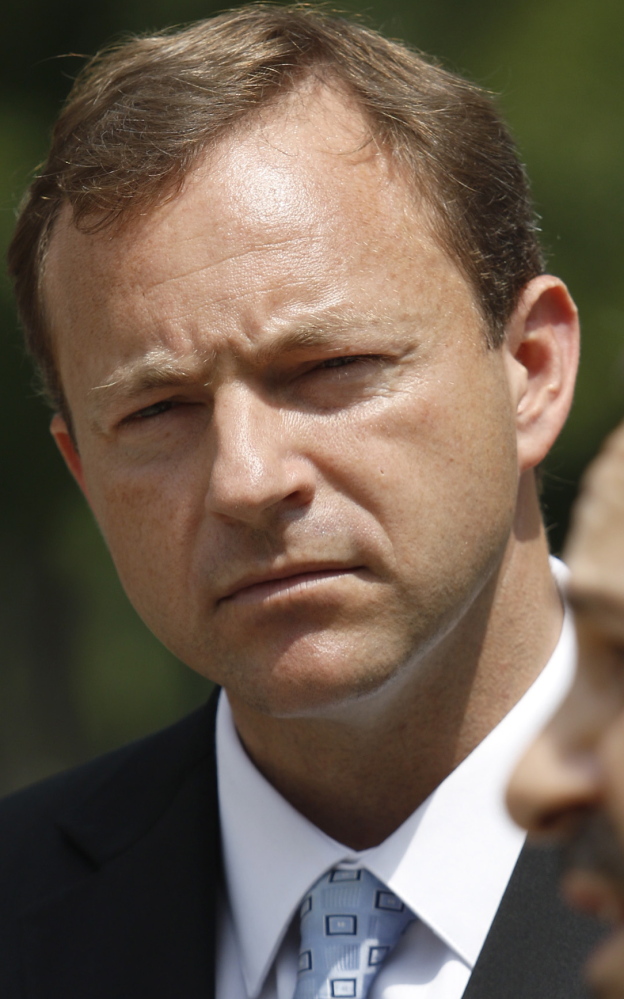Attorneys for House Speaker Mark Eves asked a federal appeals court Wednesday to overturn an earlier decision to dismiss Eves’ lawsuit against Gov. Paul LePage.
David Webbert said in a statement after the hearing that he was confident in his appeal and said “both the U.S. and Maine constitutions make it clear that our politicians are not above the law.”
The governor’s attorney, Patrick Strawbridge, declined to comment.
Eves, the Democratic leader from North Berwick, sued the Republican governor last summer, alleging that LePage abused his power by threatening to withhold state funding if an educational institution in central Maine moved forward with hiring Eves to be its president.
The board of Good Will-Hinckley school in Fairfield did ultimately rescind its offer to Eves, citing the governor’s threats as one of the main reasons.
Eves argued that the governor used his executive power to intercede into his private life for political retribution. LePage, through his attorneys, has said his actions were protected as free speech.
In May, U.S. District Court Judge George Singal sided with LePage and tossed out the suit. Eves appealed almost immediately.
Lengthy briefs were filed this summer by Webbert and Strawbridge.
On Wednesday, each side addressed a three-judge panel seated in the 1st U.S. Circuit Court of Appeals in Boston, which will issue a written ruling on the case at a later date. If the case is overturned on appeal, it would be sent back to Maine to be tried.
Webbert said the appellate judges asked several questions that gave him confidence the case may be sent back for a trial.
“The Court recognized that Maine has a ‘citizen legislature” and that the need of Maine Legislators to make a living makes them vulnerable to threats by a Governor to punish them in their ‘private life,'” the attorney said in a statement.
Although he declined to comment on Wednesday’s hearing, Strawbridge wrote this summer that the earlier decision should be affirmed.
“This is a dispute properly resolved in the political arena, not the federal courts,” the governor’s attorney wrote. “As the complaint acknowledges, the speaker and the governor are political opponents who have clashed on numerous policy issues. It is hardly surprising, then, that they disagreed over whether the speaker was an appropriate steward of millions of dollars of future state funding for Maine’s first charter school, especially given the speaker’s public record of opposing charter schools.”
The dispute began on June 5, 2015, the day Eves signed a two-year employment contract with the school.
On that day, LePage phoned the then-interim president of the school, Richard Abramson, and expressed his extreme displeasure about Eves’ selection. The governor also sent a handwritten note to the chairman of the school’s board of directors, called Eves a “hack” and made it clear that the school would lose the $1.06 million in discretionary funding that it expected to receive in the upcoming two-year budget cycle.
The dispute arose as the Legislature worked to finalize the state’s budget and marked a particularly frigid moment between legislators and LePage, who vowed to veto every bill sponsored by a Democrat because members of the House did not address his policy priorities.
The Good Will-Hinckley board rescinded its offer to hire Eves as its president on June 24. LePage admitted to reporters that he threatened to choke off funding. Eves filed suit the next month.
Eves accused the governor of using taxpayer money and the power of his office to prevent his hiring by Good Will-Hinckley, and contended that LePage’s actions violated several of Eves’ constitutional rights, including his First Amendment rights of free speech, free association and political affiliation, as well as his 14th Amendment right to due process.
Strawbridge argued that LePage was making a legally protected political statement when he successfully persuaded Good Will-Hinckley to fire Eves and therefore had immunity from Eves’ claim, or was otherwise protected by the First Amendment right to freedom of speech.
The 44-page decision by Judge Singal in May to dismiss the case came less than a month after attorneys for Eves and the governor argued the case before him in Portland.
In that decision, Singal wrote that however distasteful Eves found the governor’s actions, they did not breach Eves’ constitutional rights. The judge also found that LePage was entitled to qualified immunity because the statements he made about Eves did not constitute a threat to bring government power to bear against a private person or group, but were rather an “attempt to ensure that a public expenditure would be utilized to achieve a policy goal related to charter schools for at-risk youth.”
In rejecting Eves’ claims, Singal said the nature of the dispute was ill-suited to courtroom resolution. He noted that courts have found the preferred solution to political disputes is through the democratic electoral process.
UPDATE: This story was updated at 12:43 p.m. on Oct. 6, 2016 to include comments from David Webbert, attorney for Maine House Speaker Mark Eves.
Send questions/comments to the editors.


